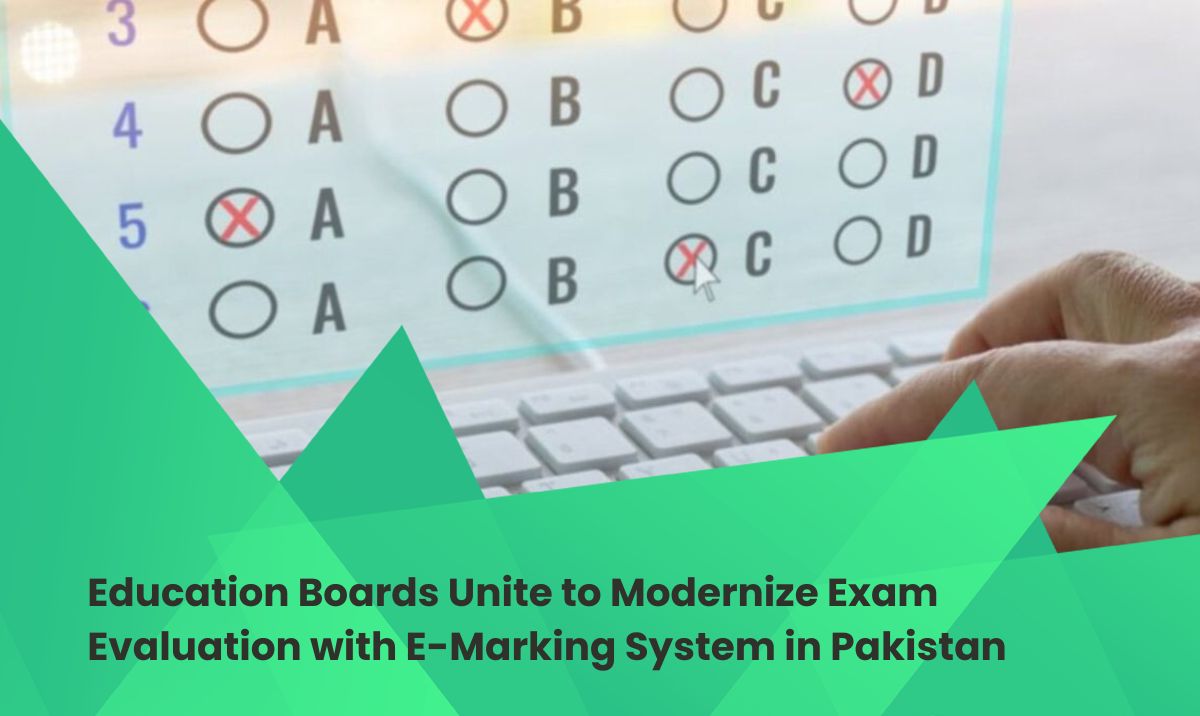
Education Boards Unite to Revolutionize Exam Evaluation with E-Marking System in Pakistan
In a major step toward educational reform, Pakistan’s leading educational boards have joined hands to introduce a modern e-marking system aimed at transforming the traditional examination evaluation process. The initiative, led by the Inter Boards Coordination Commission (IBCC), seeks to bring transparency, efficiency, and credibility to the country’s assessment system by integrating automation, Optical Mark Recognition (OMR), and digital marking technologies.
The high-level meeting, held at the Federal Board of Intermediate and Secondary Education (FBISE) headquarters in Islamabad, was attended by top education officials, including Chairman of the Board of Intermediate Education Karachi (BIEK), Faqir Muhammad Lakho; Chairman of Sindh Board of Technical Education, Musharraf Ali Rajput; and FBISE Chairman, Dr. Ikram Ali Malik. The participants discussed the roadmap for implementing the automation and e-marking system across provincial boards to ensure uniformity and fairness in paper marking.
MoU to Strengthen Inter-Board Cooperation
During the meeting, all three boards agreed to sign a Memorandum of Understanding (MoU) to formalize their collaboration. Under the agreement, the Federal Board will provide complete technical assistance, training, and infrastructure support to the Karachi and Sindh Technical Boards.
In the first phase, two officers from each provincial board will receive specialized training in e-marking and automation technologies at the Federal Board headquarters in Islamabad. Once trained, these officers will help implement and monitor the digital systems within their respective boards. The FBISE’s tested model of automation and e-marking will serve as the foundation for replication in Karachi and Sindh.
This partnership will not only standardize the evaluation process across boards but also ensure that students from all regions are assessed under uniform and transparent criteria.
A Step Toward Transparent Examination Practices
The introduction of e-marking and OMR systems is being hailed as a revolutionary step toward eliminating human error, favoritism, and inconsistencies in manual marking. According to FBISE Chairman Dr. Ikram Ali Malik, this initiative aligns with the government’s broader vision of digital transformation in education.
He emphasized that automation and e-marking will significantly enhance the accuracy, reliability, and speed of result compilation. Moreover, it will help restore students’ confidence in the fairness of examinations—a concern often raised in the past due to discrepancies in manual paper marking.
Dr. Malik further added that the Federal Board is committed to assisting other provincial and technical boards in adopting modern technologies to ensure that the entire examination system in Pakistan moves toward global best practices.
Karachi Board’s Pilot Project Shows Success
During the meeting, Chairman BIEK Faqir Muhammad Lakho shared the success story of a recent pilot e-marking project conducted by the Karachi Board. For the Intermediate Part-I Mathematics exam 2025, the Karachi Board used an electronic marking system for the first time. The initiative yielded encouraging results, with significant improvements in evaluation speed, transparency, and overall efficiency.
Lakho stated that this successful experiment reflects the potential of technology-driven evaluation methods to replace outdated manual systems. He expressed optimism that with the Federal Board’s support, the Sindh and Karachi boards will soon fully transition to e-marking across all subjects and grades.

Training and Implementation Plan
According to the plan discussed at the meeting, the implementation of automation and OMR systems will take place in multiple phases. Initially, technical training sessions will be conducted for examination staff, evaluators, and IT experts. These training modules will cover various aspects of digital paper checking, automated result processing, and data management.
Once the pilot phases are successfully completed, the full-scale rollout of e-marking will begin for matric and intermediate exams across Sindh and other provinces. The Federal Board’s IT Director, Dr. Bashir Khan, and Controller of Examinations, Aqeel Imran, also participated in the meeting and provided valuable insights into the operational aspects of automation.
They highlighted how the Federal Board’s digital infrastructure has already proven effective in managing large-scale examinations without delays or irregularities. Their expertise will serve as a blueprint for other boards aiming to modernize their examination systems.
Benefits for Students and Teachers
The introduction of e-marking technology is expected to bring widespread benefits for both students and educators. Students will receive faster and more accurate results, while teachers will benefit from reduced workload and objective assessment standards.
Furthermore, this initiative supports the broader academic ecosystem by aligning with modern learning resources such as:
-
12th Class Books – Updated textbooks aligned with the new evaluation system.
-
12th Class Notes – Comprehensive study notes designed to help students prepare for exams under the e-marking system.
-
12th Class Guide – Subject-wise guides offering smart preparation strategies.
-
12th Class Past Papers – Essential resources for understanding exam patterns and improving time management.
By connecting classroom learning with modern evaluation methods, Pakistan’s education system is taking a significant leap toward digital transformation and global competitiveness.
A Step Toward Digital Pakistan in Education
The IBCC’s initiative represents a critical move toward achieving “Digital Pakistan” in the education sector. By integrating e-marking and automation, the country’s examination system will not only enhance transparency but also minimize administrative challenges and ensure faster result processing.
This modernization drive signifies a future where technology and education go hand in hand—making learning, teaching, and assessment smarter and more efficient. With the active collaboration of the Federal Board, Sindh Technical Board, and Karachi Board, Pakistan is steadily moving toward a new era of digital education governance that prioritizes merit, fairness, and innovation.















